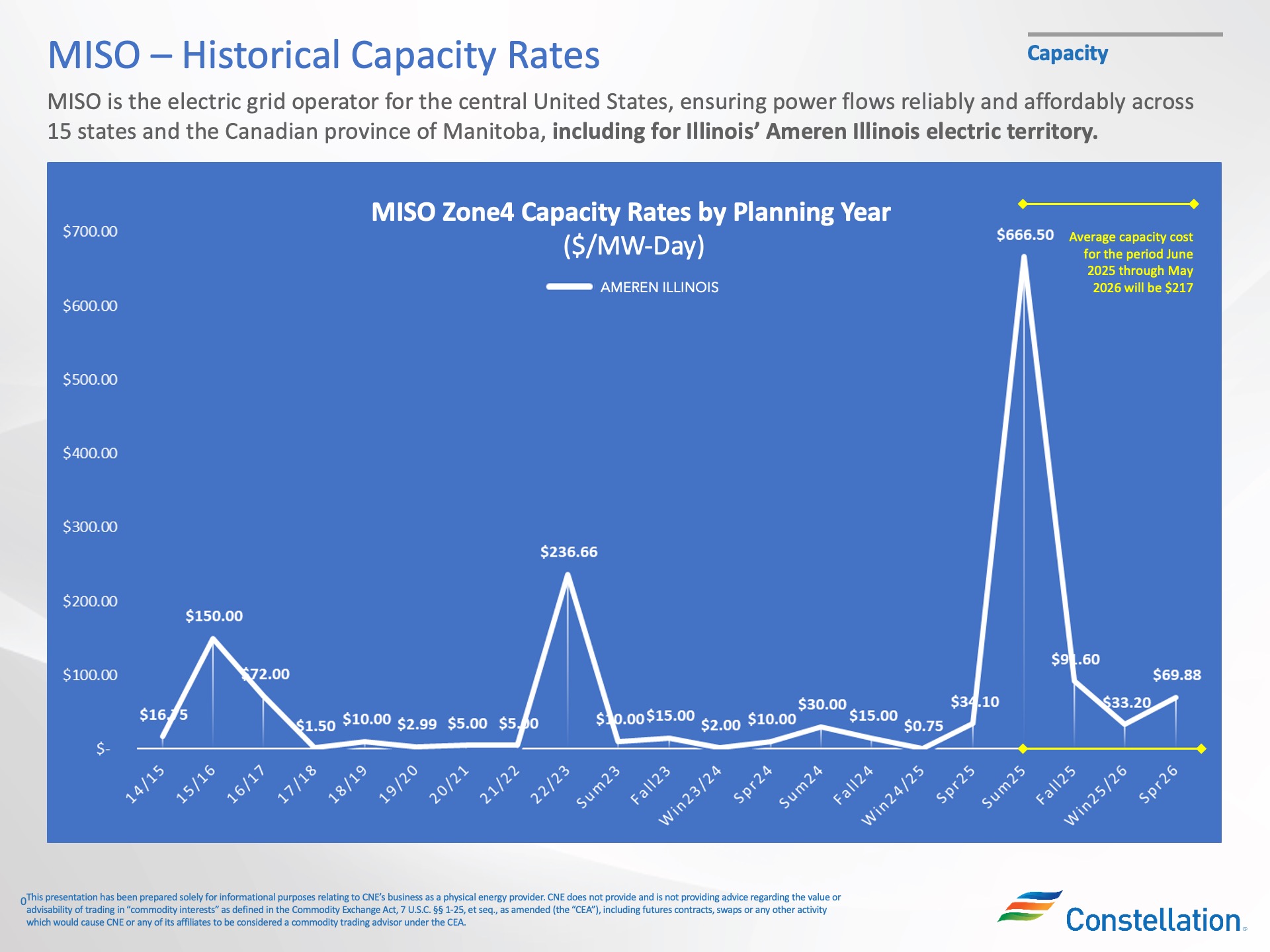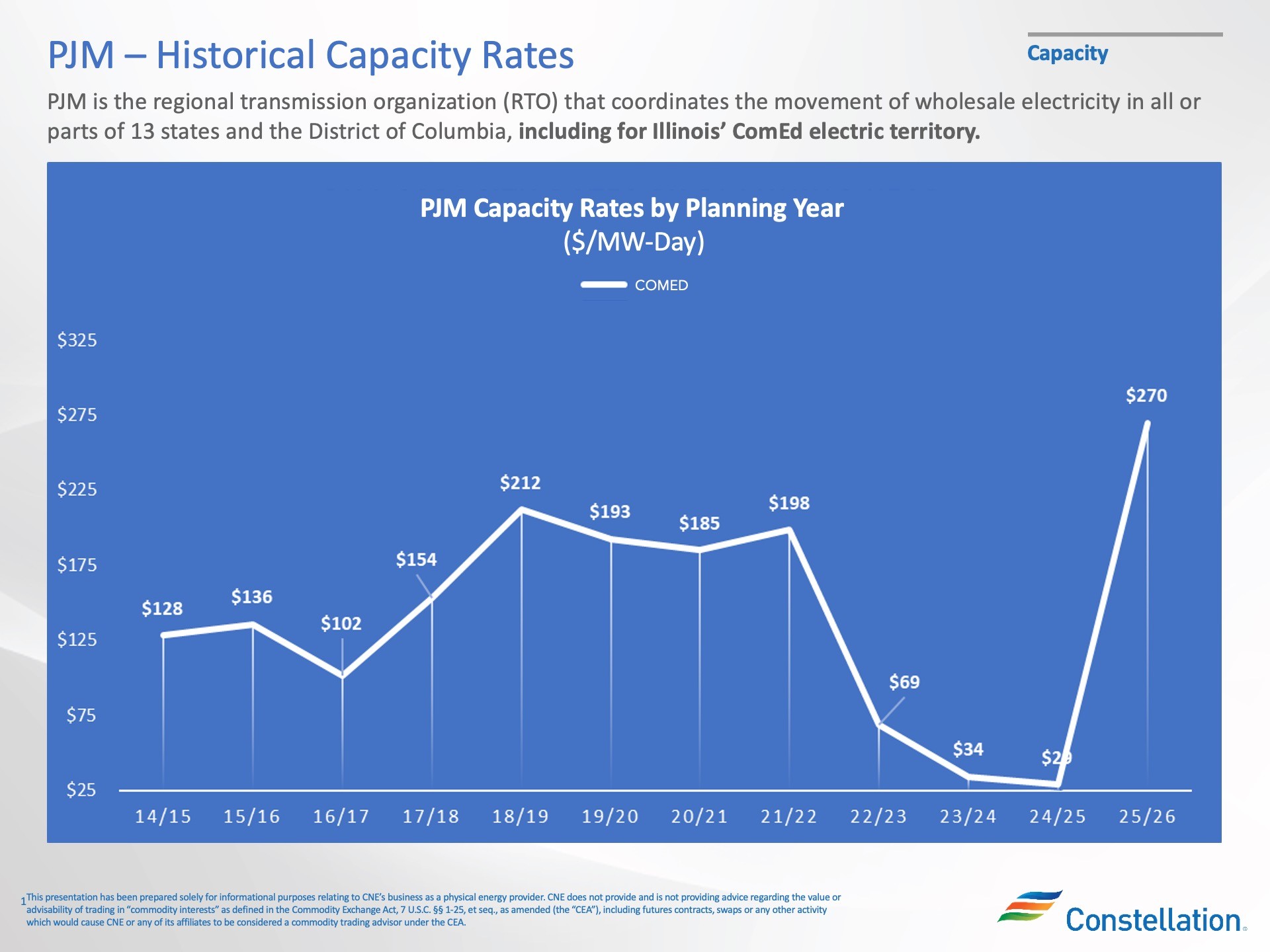Electric bills are expected to surge
What you need to know:
- MISO and PJM capacity auctions cleared at significantly higher prices for the 2025-2026 Planning Year: June 1, 2025, through May 31, 2026. MISO and PJM are the Regional Transmission Organizations (RTOs) that coordinate the movement of wholesale electricity in Ameren Illinois and ComEd electric territories, respectively.
- Ameren Illinois and ComEd electric customers will soon see the effects of these higher prices for the first time on invoices received in June/July.
- Ameren Illinois, ComEd, nor suppliers have any control over these charges, nor do they have any power to change them – so, please don’t be fooled and don’t blame them.
- Due to a multitude of variables, Retail Energy Suppliers (RES) are handling this additional cost in many ways, according to supply contract terms and conditions as well as internal policy decisions.
Click the images below to view them larger.
Are all customers charged for capacity?
All customers operating in Ameren Illinois and ComEd territories must pay the capacity charge, a supply-related component of their electric bills, regardless of who they purchase electricity supply from, their utility or a supplier.
It is important to note capacity prices are not set by Ameren Illinois or ComEd, nor by retail energy suppliers such as Constellation, IRMA’s endorsed supplier. MISO and PJM capacity prices are set by auction 12 months at a time and are approved by the Federal Energy Regulatory Commission (FERC). Depending on who invoices you for your electricity supply – Ameren Illinois, ComEd or a supplier —that entity is responsible for collecting these charges from customers and paying the MISO and PJM on their behalf. They do not have any control over these charges and must pass these costs on to the consumer with no mark up, nor do they have any power to change them – so, please don’t be fooled and don’t blame Ameren Illinois, ComEd or a supplier.
When will prices increase and by approximately how much?
Electric customers across the state have felt or will soon feel the effects of the substantial increase in the capacity charge for the first time on invoices received in July 2025 for the June/July billing period. Capacity is one of many components of our supply-related charges and is a result of capacity auctions in each of the RTOs.
- In ComEd territory, PJM capacity prices will surge to levels more than nine times higher than the previous year, increasing supply prices by approximately 1.5 to 3 cents per kWh annually (average of 2.25 cents).
- For MISO capacity prices that affect customers of Ameren Illinois territories, an increase of 1.2 to 1.8 cents per kWh annually (average of 1.5 cents) is expected.
Whoever invoices customers for supply-related charges (i.e., Ameren Illinois, ComEd, or a supplier) collect and pay the corresponding RTO each month on behalf of customers. Many experts believe these prices will stay high for at least the next several years.
How will the higher prices be handled if my current supply contract was executed before the significant increase in capacity rates were know for the MISO and PJM 2025-2026 planning years?
Those who contract with Retail Energy Suppliers (RES) to purchase their electric supply will see suppliers handle the increased capacity costs in many ways, according to contract terms and conditions as well as internal policy decisions. For instance:
- If a customer executed a multi-year supply contract since August 2024 and chose to fix all supply-related charges including capacity, they may have already “felt” the higher cost.
- Many customers have contracts allowing suppliers to “adjust” a fixed price as certain charges change. For example, changing the contract price each June as the capacity charge rises or falls.
- Others may have chosen to not fix the capacity charge, opting to pass through the actual charge each month. Whoever invoices customers for supply-related charges (i.e., either a supplier, Ameren Illinois or ComEd) must collect and pay the corresponding RTO on behalf of customers. With the “pass through” product, customers will see the increased capacity charge in July possibly in June. Pass-through capacity charges mean that the customer’s price for capacity fluctuates based on changes in the actual capacity costs assessed by the regional grid operator (MISO for Ameren Illinois customers and PJM for ComEd customers). Essentially, the customer pays the actual, or “passed through,” capacity costs incurred by the supplier.
What else do I need to be aware of?
CAUTION: Going forward, if you receive price offers/bids from a supplier that don’t appear to include a significant increase, it could be that the capacity price has not been reflected in the offer. Rather, it could be passed through, thus not providing an estimate of what your future costs will be. Passing through capacity and/or other charges is not a bad thing as long as a supplier is not doing so to avoid showing customers the reality of future costs and/or they are trying to outbid their competitors. Most all suppliers can provide an estimate of what you will pay for capacity even if you do not choose the fixed price option.
For more information:
- If you are contracting for electric supply for your stores located in Ameren Illinois or ComEd electric territories, contact your Retail Electric Supplier
- If you are purchasing electric supply from Ameren Illinois and/or ComEd, contact the respective utility:
- Ameren Illinois Customer Service for Business: 1-800-232-2477 (Hours 7:00 a.m. – 7:00 p.m., Monday through Friday)
- ComEd Customer Service for Business: 1-877-4-ComEd-1 (1-877-426-6331) (Hours 7:00am-7:00pm, Monday through Friday)
Last, but not least, do not hesitate to contact IRMA at info@irmaenergyservices.org.




